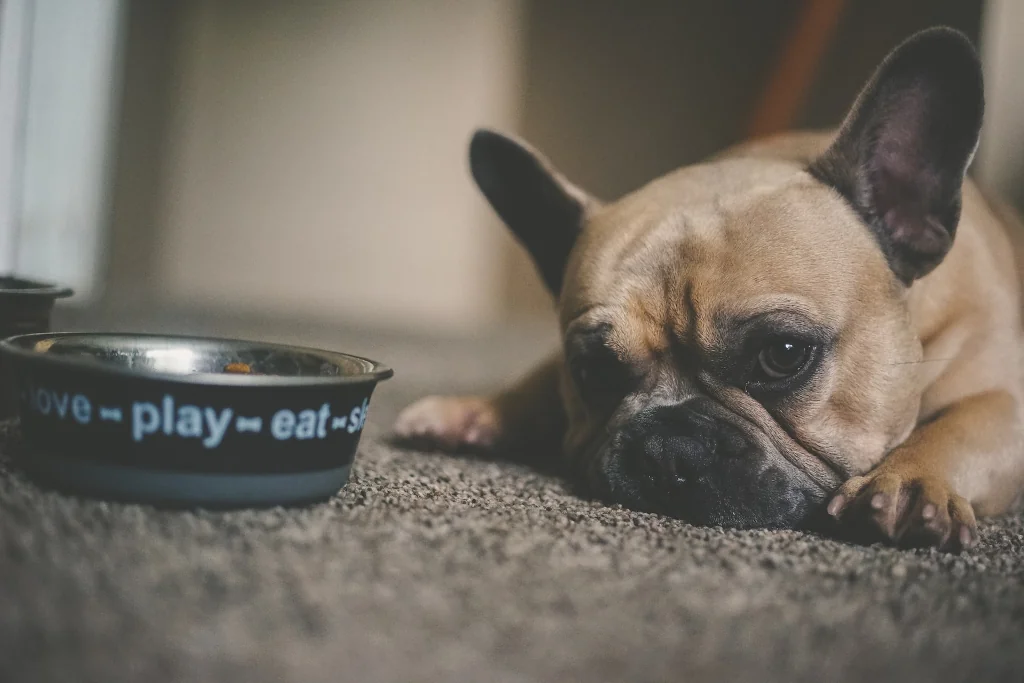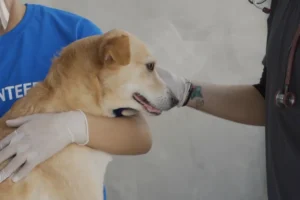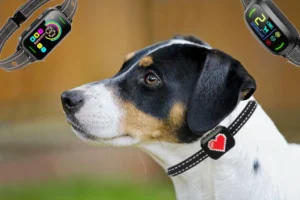Disclosure: We may earn a commission from helpful, relevant links in our content. No cost to you. See our privacy policy.
Ever witnessed your canine companion chow down on something they really shouldn’t have? The shock and fear is all too real. What should you do if your dog ate some metal?
But, let’s dive deeper into what happens in such instances. As pet parents, it’s essential to understand our furry friends, their behaviors, and how to keep them safe. Especially when it comes to their curious eating habits.

Can a Dog’s Stomach Break Down Metal?
Your pup’s stomach is not equipped to handle actual steel – or any kind of metal for that matter.
Dogs, like humans, have a digestive system designed for breaking down food, not hard and indigestible materials such as metal (except for Zinc, which causes toxicity).
Ingested metal won’t be broken down in their stomach or intestines. Instead, it may travel through the digestive tract, potentially causing harm along the way. This is why it’s so important to keep small objects, particularly metal ones, out of our furry friends’ reach.
However, the ingestion of zinc or lead can be very harmful to dogs and can cause the serious symptoms. Zinc is found in many objects, including pennies (U.S. pennies minted after 1982 contain high levels of zinc), nuts, bolts, and other hardware items. In the acidic environment of the stomach, zinc can be leached from these objects and absorbed into the bloodstream.
This can lead to zinc toxicosis, a condition that can cause hemolytic anemia (destruction of red blood cells), as well as kidney, liver, and heart damage.
Here are the risks associated with different types of metal ingestion:
| Metal | Risk |
|---|---|
| Zinc (e.g., post-1982 pennies, hardware) | Zinc toxicosis: anemia, organ damage |
| Lead (e.g., sinkers, weights) | Lead toxicosis: GI and neurological symptoms |
| Iron (e.g., some hardware, supplements) | Iron toxicosis: GI upset, organ failure |
| Copper (e.g., coins, wiring) | Copper toxicosis: GI signs, potential liver damage |
| Aluminum (e.g., foil, cans) | Generally low toxicity, but can cause GI obstruction |
While each dog may react slightly differently, and the specific symptoms can depend on various factors like the amount ingested, these are still general risks associated with dogs ingesting those types of metal.
Now that we’ve understood this, let’s discuss what to do if your dog does end up swallowing some metal.
What to Do if Your Dog Swallowed Some Metal?
Finding out that your dog has swallowed a piece of metal can be quite unsettling. However, with the right actions, you can address this issue swiftly and confidently. Here’s your step-by-step guide:
- Don’t Panic, But Don’t Ignore It Either. Stay calm but act promptly. While it may be tempting to handle the situation on your own, professional advice is crucial.
- Contact Your Vet Immediately. Internal damage isn’t always immediately visible. Call your vet, even if your dog appears fine. The sooner you seek help, the better the outcome is likely to be.
- Provide Detailed Information. To effectively assist you, your vet will need as much information as possible. Try to provide details about the type of metal swallowed, its size, and when the incident occurred.
- Follow Your Vet’s Recommendations. Depending on the specifics of the situation, your vet may suggest different procedures. An x-ray might be needed to determine the size and location of the object. In more severe cases, surgical intervention may be necessary.
- Monitor Your Dog Post-Incident. Once the immediate situation is dealt with, keep an eye on your pet for any unusual behaviors or symptoms. Stay in close contact with your vet until your dog is completely out of the woods.
Signs Your Dog Needs Immediate Veterinary Attention
No two dogs are the same, so it’s essential to observe your furry friend for any signs of discomfort or distress. While some dogs might show immediate symptoms after swallowing metal, others might not. However, there are some common indicators to watch out for:
- Vomiting or attempts to vomit
- Lack of appetite or difficulty eating
- Lethargy or changes in behavior
- Abdominal pain or swelling
- Blood in stool or dark, tarry stool
- Excessive drooling
- Coughing or gagging
These symptoms could suggest that the swallowed metal is causing harm internally. If you notice any of these signs, don’t hesitate – it’s time to seek professional help.
Remember, these signs can also occur in various other conditions. So, a vet’s examination is always necessary to identify the exact cause and ensure proper treatment.
Can a Dog Swallow a Wire Without Harm?
It’s challenging to predict the potential harm of a dog swallowing a wire. While some fortunate dogs might pass small, smooth wire fragments without any complications, this isn’t the norm.
The danger lies in the wire’s potential to cause physical damage during its journey through the digestive tract. It might cause scratches, punctures, or even severe perforations, leading to life-threatening conditions like peritonitis.
The wire’s length, thickness, and shape, along with the dog’s size and overall health, also factor in. However, it’s crucial to understand that no type of wire is safe for ingestion. If your dog swallows wire, don’t wait for symptoms to appear – reach out to your vet immediately.
Every situation is unique, and while we can provide guidance, there is no substitute for professional veterinary advice. The health and well-being of your pet are always worth the caution!
Suggested reading: Dog Ate Permanent Marker
How to Discourage Your Dog From Eating Non-food Items?
Keeping dogs away from non-food items might sometimes feel challenging, but with these practical strategies, you can help them build healthy habits:
- Maintain a Clean Environment. By keeping your living area tidy and free from potential hazards like loose wires and small metal objects, you reduce the chances of accidental ingestion.
- Encourage Healthy Chewing Habits. A variety of suitable chew toys can satisfy your dog’s natural urge to chew and divert their attention from non-food items. Keep it interesting by rotating toys regularly. A fantastic chew toy that is both safe and durable is Petstages Dogwood Stick. This toy can deter your pet from seeking out less suitable objects, such as metal, to satisfy their chewing urge.
- Make Mealtime a Game. Puzzle feeders make feeding time more engaging and challenging, keeping your dog occupied and less likely to munch on non-food items. Outward Hound Fun Feeder Slo Bowl is a non-toxic, interactive feeder that prolongs your dog’s feeding time, effectively reducing the chances of indigestion and the urge to chew on inappropriate items. Its maze-like design turns mealtime into a game and challenges your dog mentally.
- Training and Supervision. Commands like “leave it” and “drop it” can be lifesavers. Supervision is particularly important when in new environments or around unknown objects.
- Ensure Regular Vet Checks. Unusual eating behaviors might indicate nutritional deficiencies or health problems. Regular vet checks can help ensure that your pet isn’t consuming non-food items due to underlying health issues.
- Introduce Taste Deterrents. An underutilized strategy is to use taste deterrents on items your dog shouldn’t chew. These are non-toxic sprays that taste unpleasant to dogs, discouraging them from chewing on certain items. Please remember to use these products as directed by the manufacturer or your vet.
What You Learned
Navigating the unpredictable world of our curious canines can be challenging, yet rewarding. Armed with the insights shared in this blog post, you now hold the tools to not just react when your pup makes a metallic meal but to proactively create an environment where such incidents are less likely.
May your journey be filled with fewer unwelcome surprises and more moments of joy and companionship. Remember, our furry friends don’t need perfect—they just need you. Continue to learn, to grow with them, and most importantly, to keep their world as full of love and as free of metal as possible!
Might be interested in: Dog Ate Silly String
FAQs
Can a small piece of metal pass through my dog naturally?
While it’s possible for a small piece of metal to pass through a dog’s digestive system without causing harm, it’s not guaranteed. It will depend on the shape, sharpness, and size of the object, as well as the dog’s size and overall health. Any ingestion of metal warrants immediate veterinary attention.
Can certain foods help my dog pass a swallowed object?
While some suggest feeding bulky or fibrous foods might “encase” a swallowed object and help it pass, there’s no surefire dietary solution. It depends on the type and size of the swallowed object. If you suspect your dog has swallowed something it shouldn’t have, consult a vet.
Should I try to induce vomiting if my dog swallowed metal?
Inducing vomiting after a dog has swallowed metal is not recommended. The object may cause further harm coming back up, potentially leading to choking or internal damage. Always consult a veterinarian in these situations.
Alex, a passionate animal lover, has experience in training and understanding animal behavior. As a proud pet parent to two dogs and three cats, he founded AnimalReport.net to share insights from animal experts and expand his knowledge of the animal kingdom.




